What is IELTS and Why and where it is required?
What is IELTS?
The IELTS (International English Language Testing System) is a standardized English language proficiency test designed for non-native English speakers. It assesses a person’s ability to use English in listening, reading, writing, and speaking. The test is jointly managed by British Council, IDP: IELTS Australia, and Cambridge Assessment English.
IELTS is available in two main formats:
- IELTS Academic: For higher education and professional registration.
- IELTS General Training: For migration, work, or secondary education.
Why is IELTS Required?
- For Higher Education
- For Immigration
- For Employment
- For Professional Registration
- To Demonstrate English Proficiency
Where is IELTS Required?
IELTS is recognized by over 11,000 organizations worldwide, including:
- Countries for Immigration and Study:
- Universities and Colleges:
- Professional Organizations:
- Employers
Why Choose Brahma English Academy for IELTS Classes?
1. Experienced Trainers with Proven Success Rates
Our team of expert trainers at Brahma IELTS Academy has 12+ years of experience helping students achieve their desired IELTS band scores. Trainers are British Council certified. They provide personalized guidance tailored to each student’s strengths and weaknesses, ensuring success in all sections of the exam: Listening, Reading, Writing, and Speaking.
2. Comprehensive and Structured Course Material
We offer well-structured course material designed to cover all aspects of the IELTS exam. From detailed practice tests to useful tips and strategies, our materials are updated regularly to reflect the latest test trends, giving you an edge over others. We provide you Cambridge IELTS books. We focus on improving both basic and advanced skills required to achieve top band scores.
3. Mock Tests and Real Exam Simulation
At Brahma IELTS Academy, we conduct regular mock tests under real exam conditions. This helps students experience the pressure of the actual test and understand how to manage their time effectively. With detailed feedback and performance analysis after each test, we ensure you’re fully prepared.
4. Personalized Attention for Every Student
We understand that every student learns differently, which is why we provide one-on-one attention to every student. Whether you need extra help with your writing or speaking skills, we tailor the lessons to suit your needs and help you progress quickly.
5. Flexible Class Timings to Suit Your Schedule
We offer flexible class timings that fit into the busy schedules of students. Whether you’re a working professional or a full-time student, we have multiple batches to accommodate your availability, ensuring you don’t miss any part of the preparation.
6. Expert Guidance for IELTS Reading, Writing and Speaking
Reading, Writing and speaking sections often challenge candidates the most. At Brahma IELTS Academy, we provide expert coaching in these areas, with specialized techniques to help you improve your writing coherence, task achievement, and fluency. Our speaking practice sessions with experienced trainers will help you gain confidence and achieve your target band.
7. We Help You Book the IELTS Test
We are a nodal partner of IDP IELTS, so we can book your test in advance at Brahma IELTS Academy, we go beyond just teaching. We assist you with the entire process of IELTS preparation, including helping you book your test. Our team provides guidance on test dates, locations, and registration procedures, ensuring a smooth and stress-free experience from start to finish.
8. Separate Grammar and Vocabulary Sessions
Strong grammar and a rich vocabulary are key to achieving a high IELTS band score, especially in writing and speaking. We offer dedicated grammar and vocabulary sessions to strengthen these crucial areas. Through interactive lessons and practical exercises, we help you build the language skills that will set you apart in the exam and in real-world communication.
9. Regular Feedback and Progress Tracking
We believe in continuous improvement. Our trainers regularly provide constructive feedback on assignments and test results, allowing you to track your progress and work on specific areas for improvement. This ensures you stay on the right path to success.
10. Convenient Online and Offline Classes
We offer both in-person and online classes, making it easy for you to prepare for the IELTS exam from anywhere. Our online classes use the latest tools and technologies, providing the same quality of education and resources as our in-person sessions.
11. Success Stories and High Band Achievements
Our track record of students consistently achieving high band scores (7 and above) speaks volumes about the effectiveness of our teaching methods. With thousands of successful students who have gone on to study in top universities worldwide, Brahma IELTS Academy is a trusted name in IELTS preparation.
12. Affordable and Value-For-Money Coaching
We believe in providing high-quality education at affordable prices. With Brahma IELTS Academy, you get excellent coaching at a price that doesn’t burn a hole in your pocket. Our aim is to make IELTS preparation accessible to everyone without compromising on the quality of training.
Note: To maintain students’ safety and confidentiality, student names and details have been blurred.
8.5 Band students
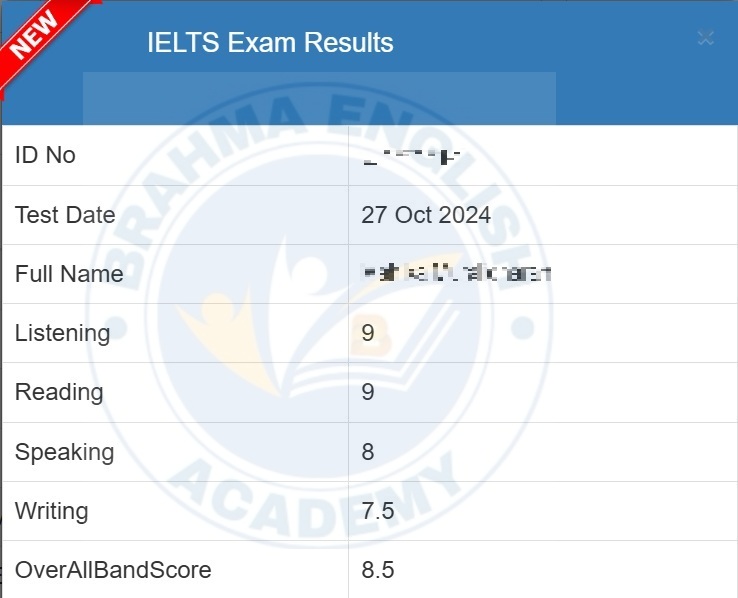
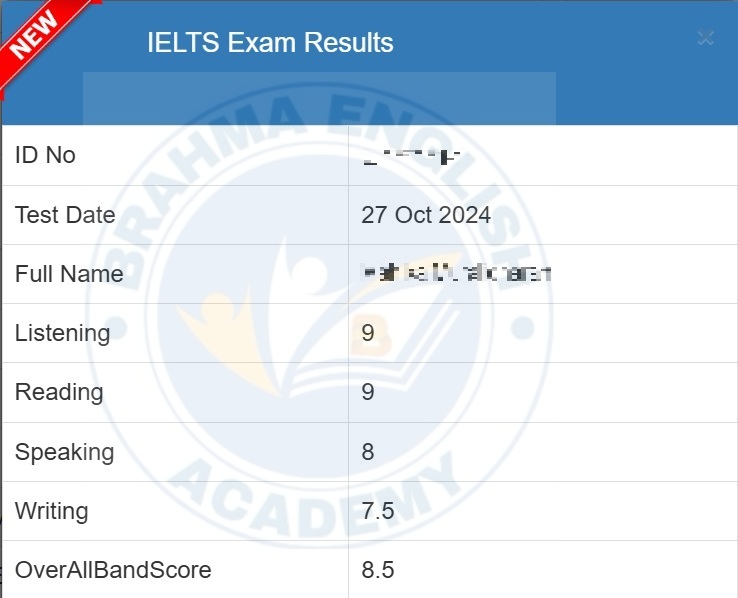
8 Band students

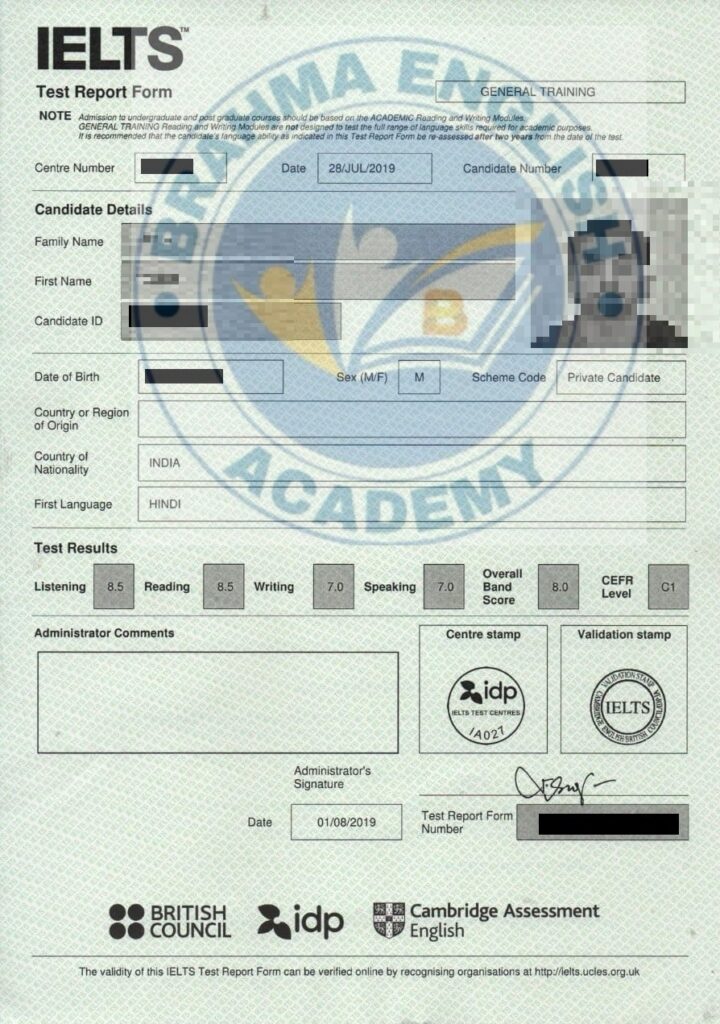
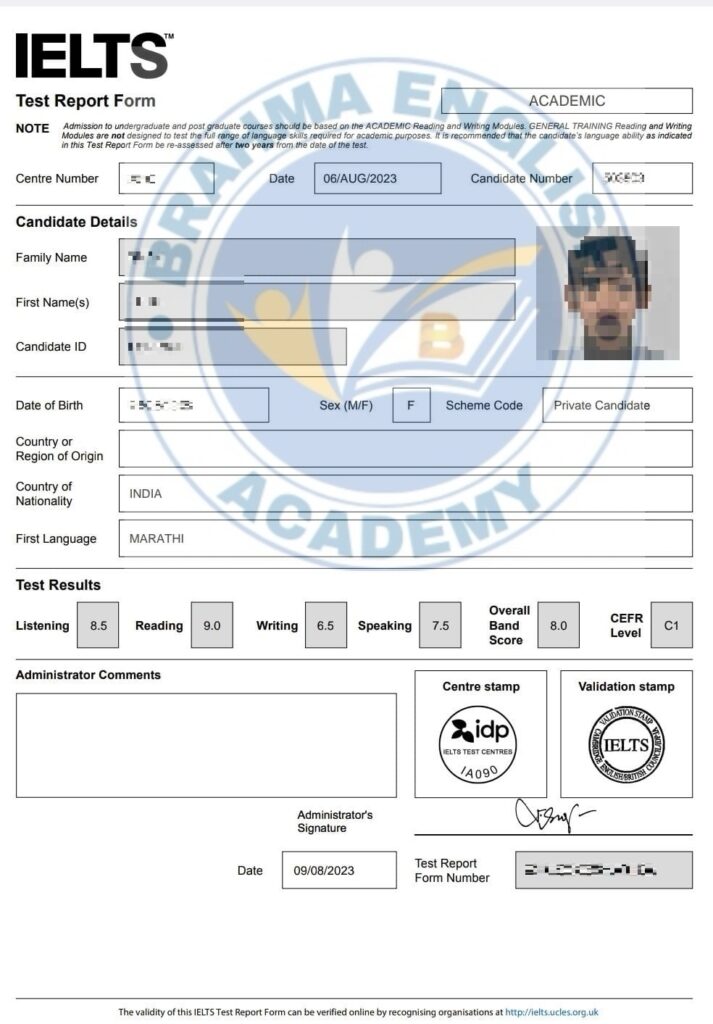
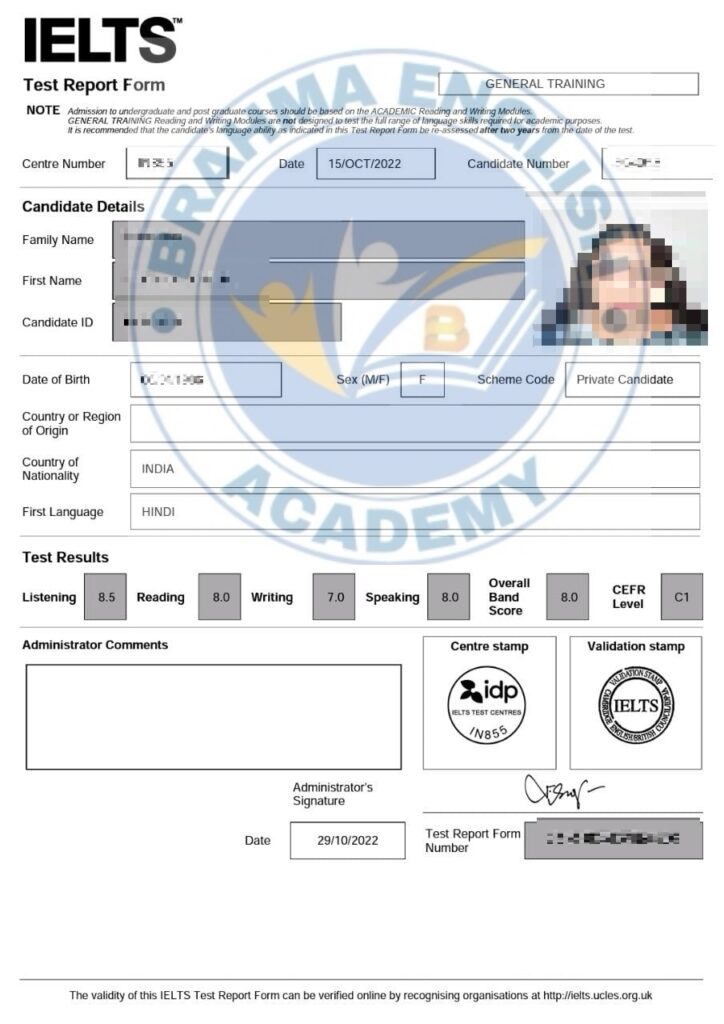
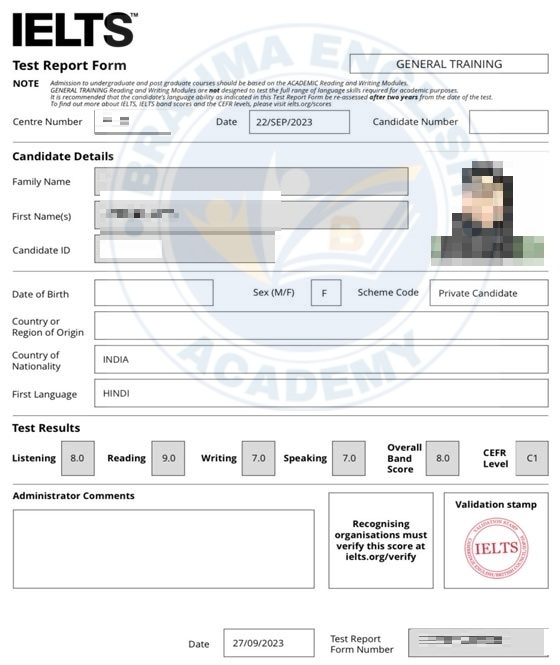
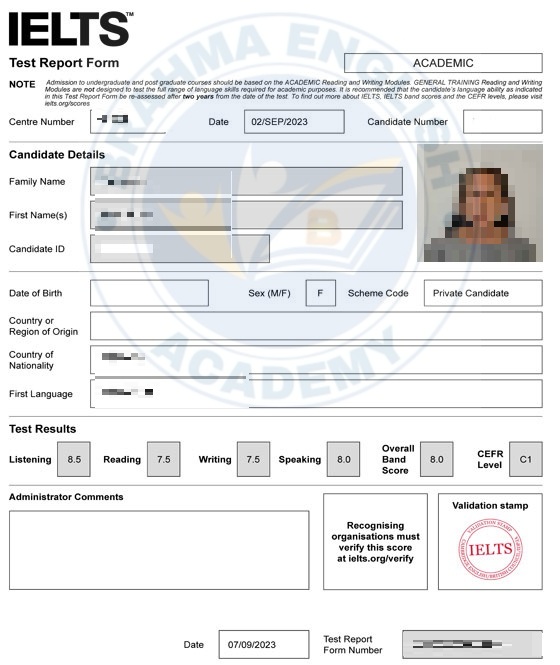

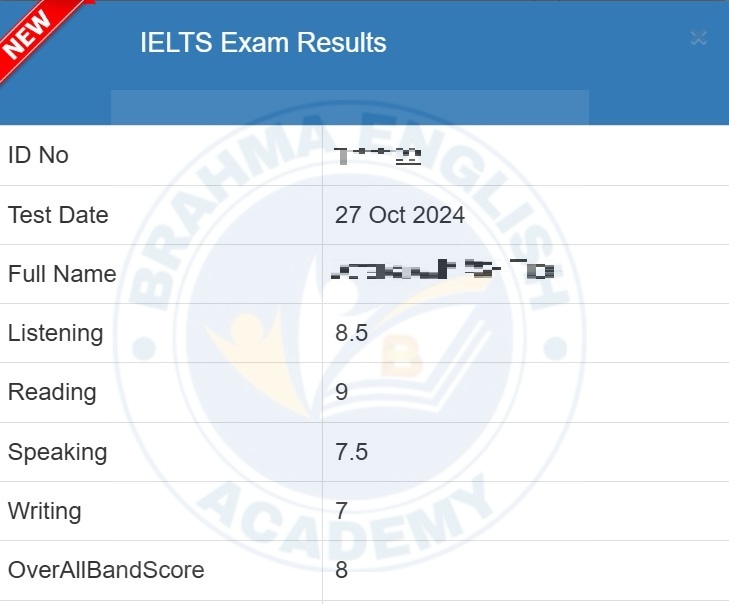
7.5 band students
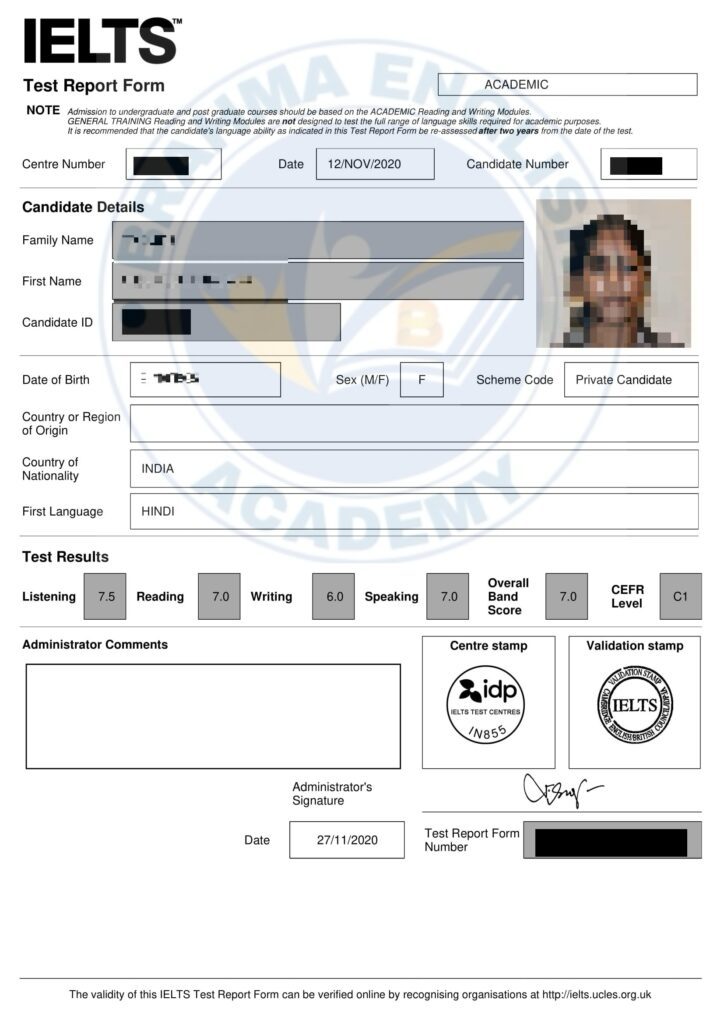
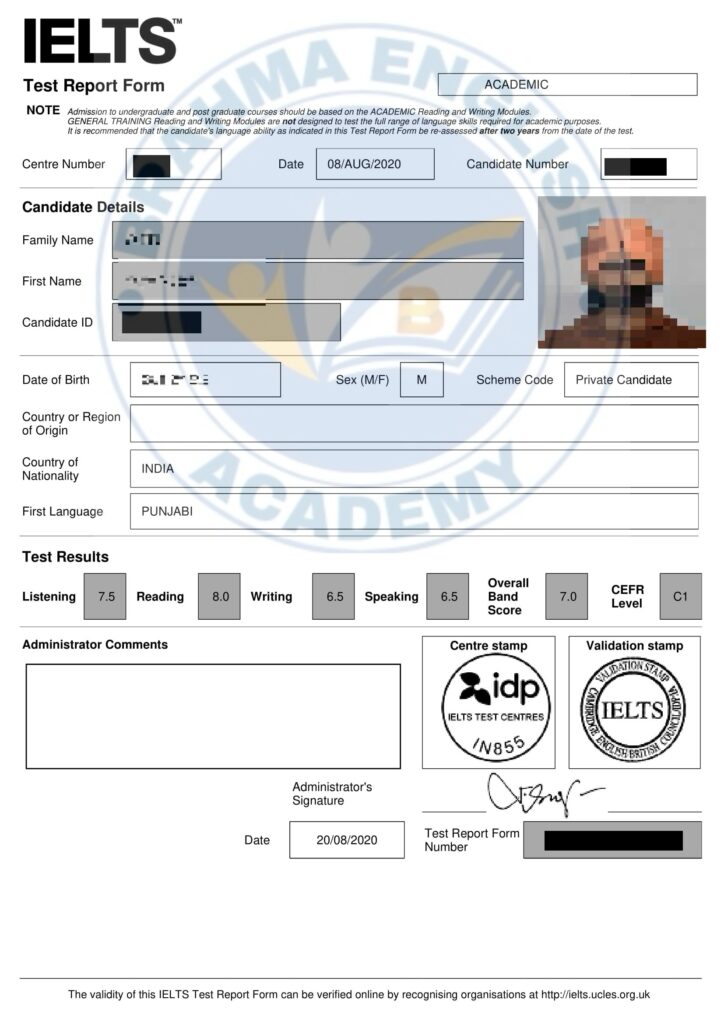






7 Band students


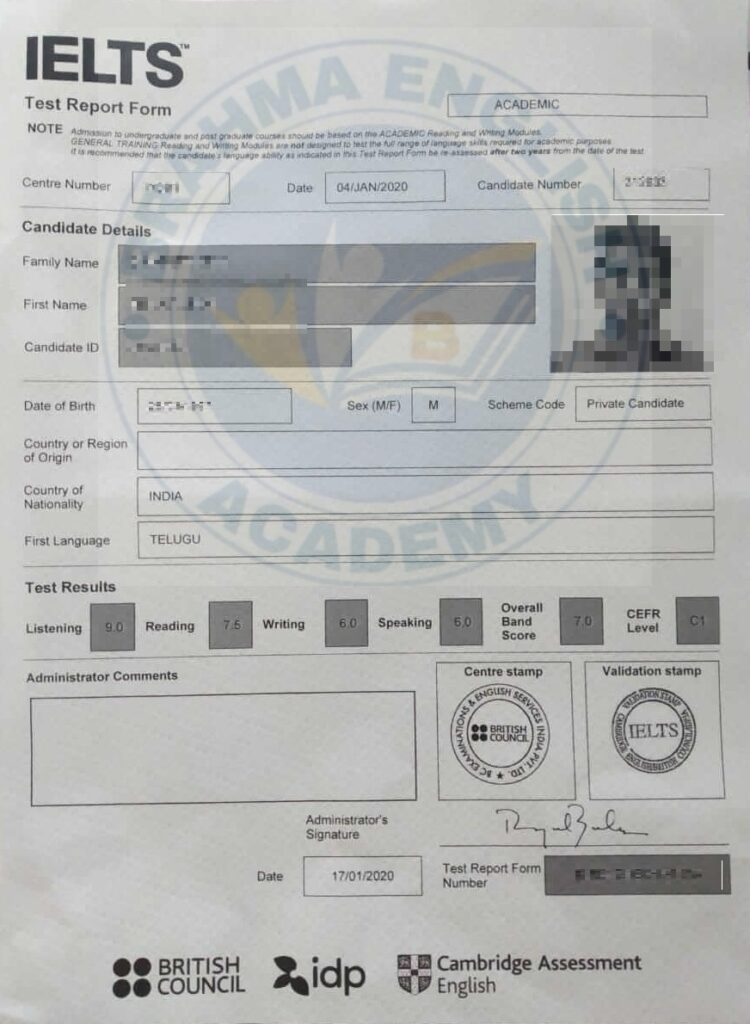

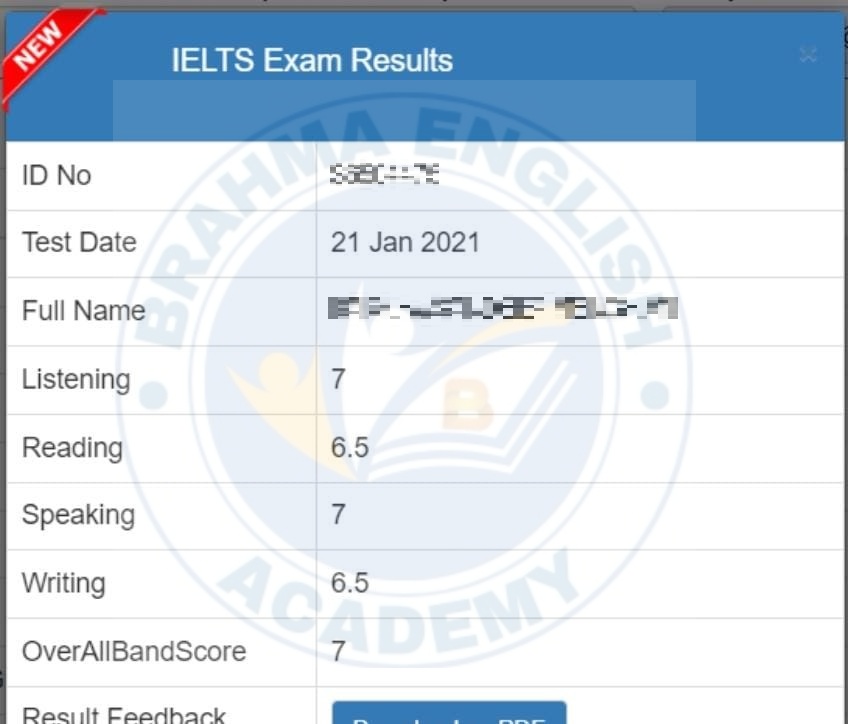
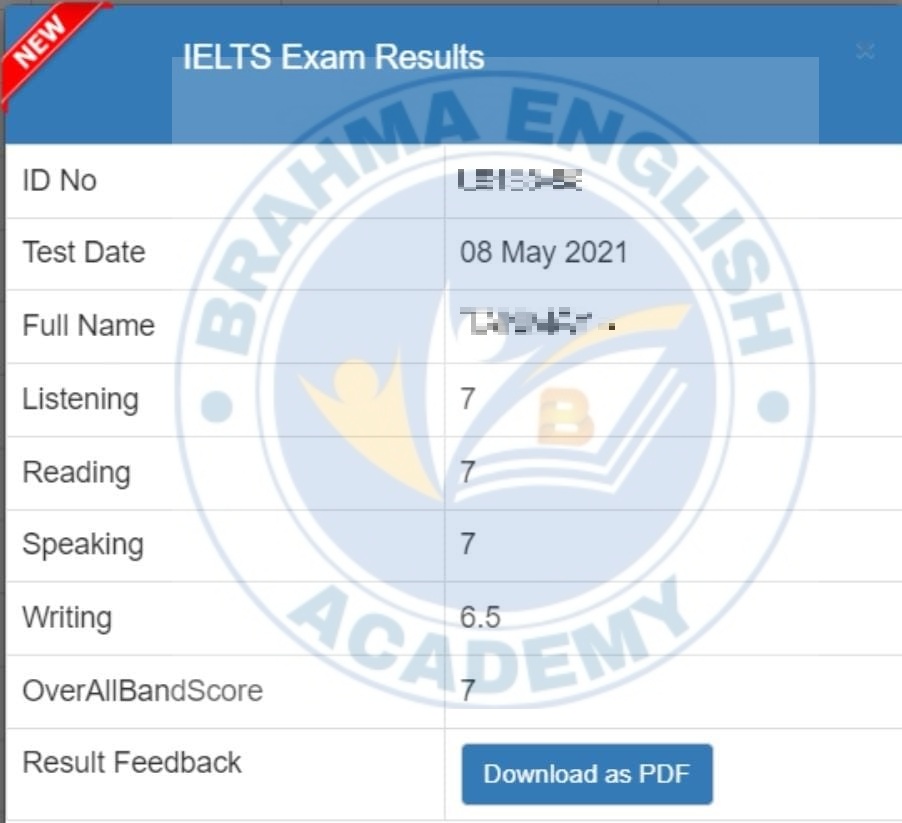
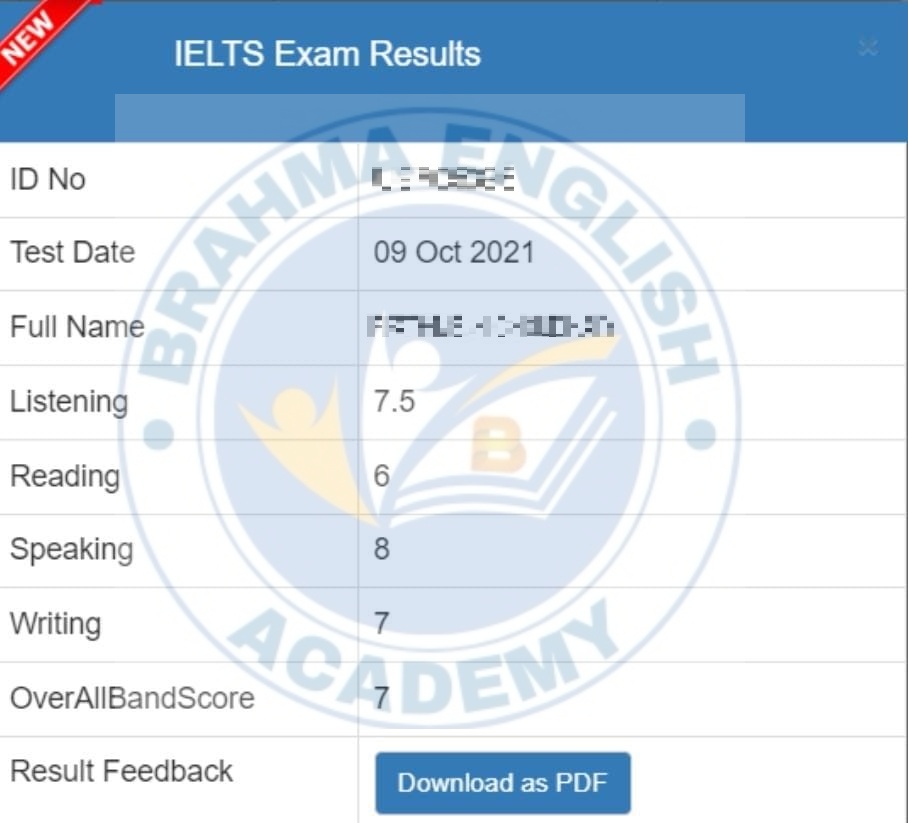

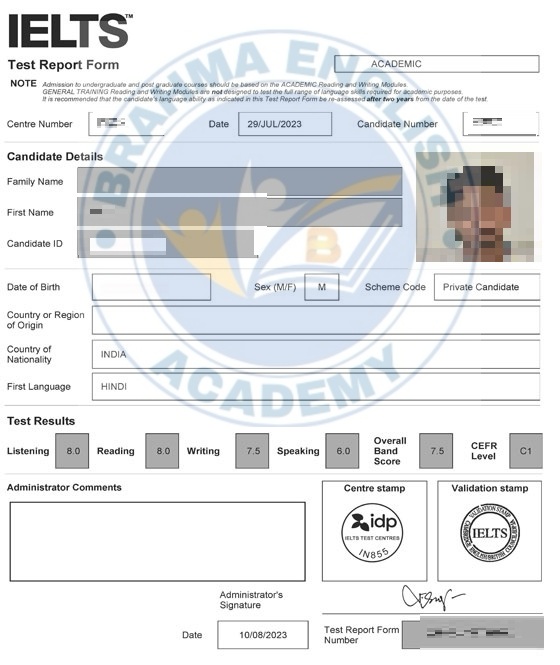
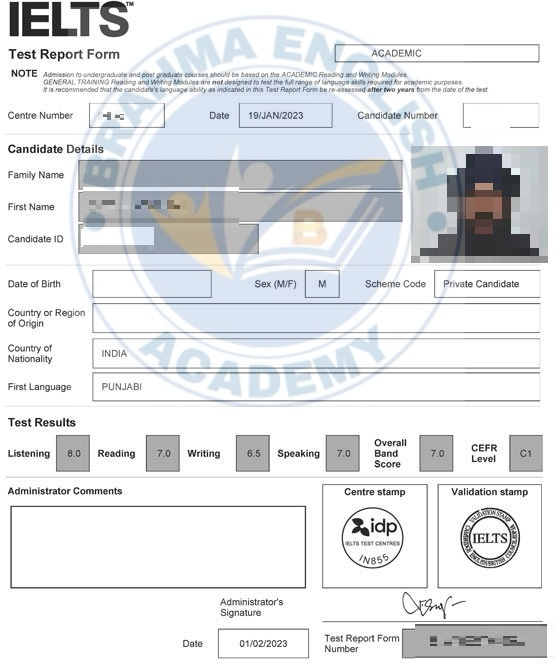
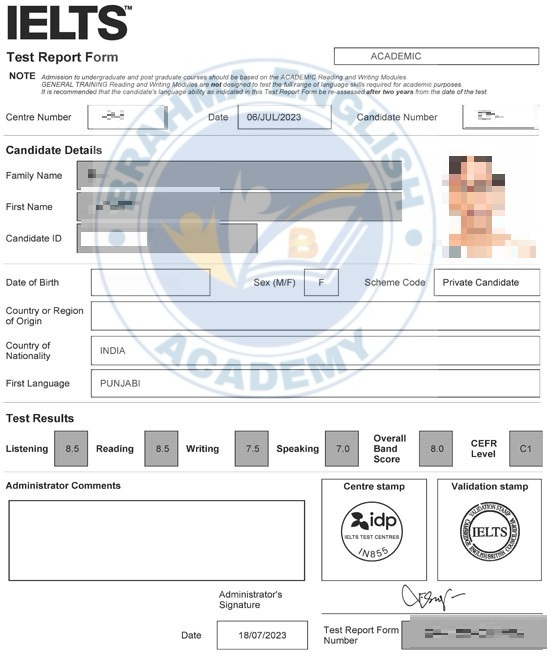

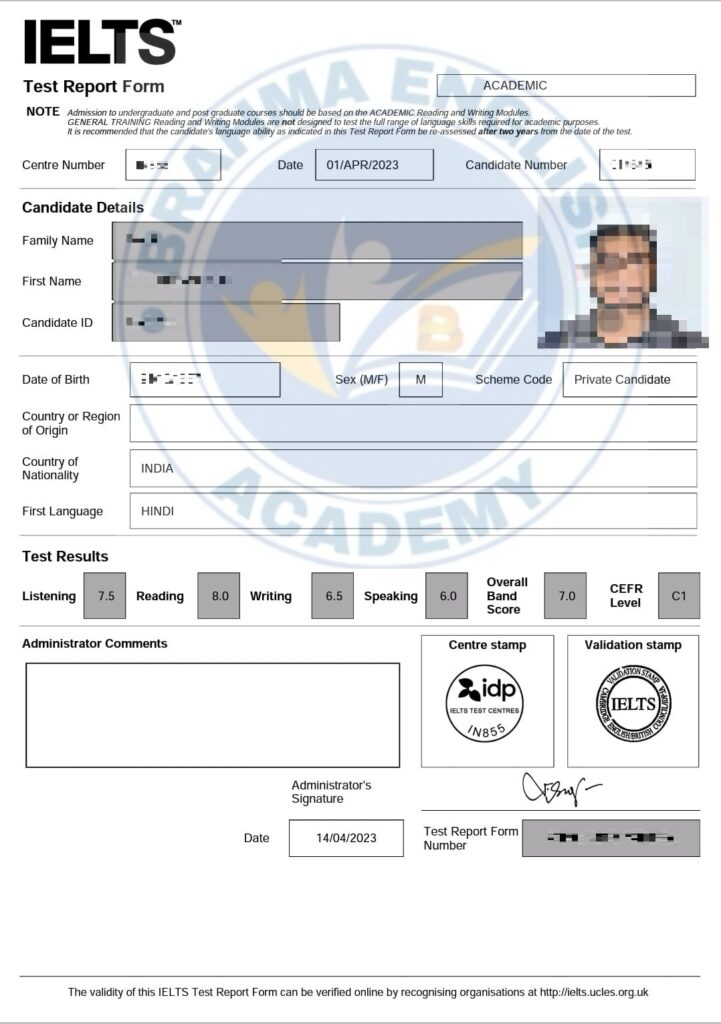
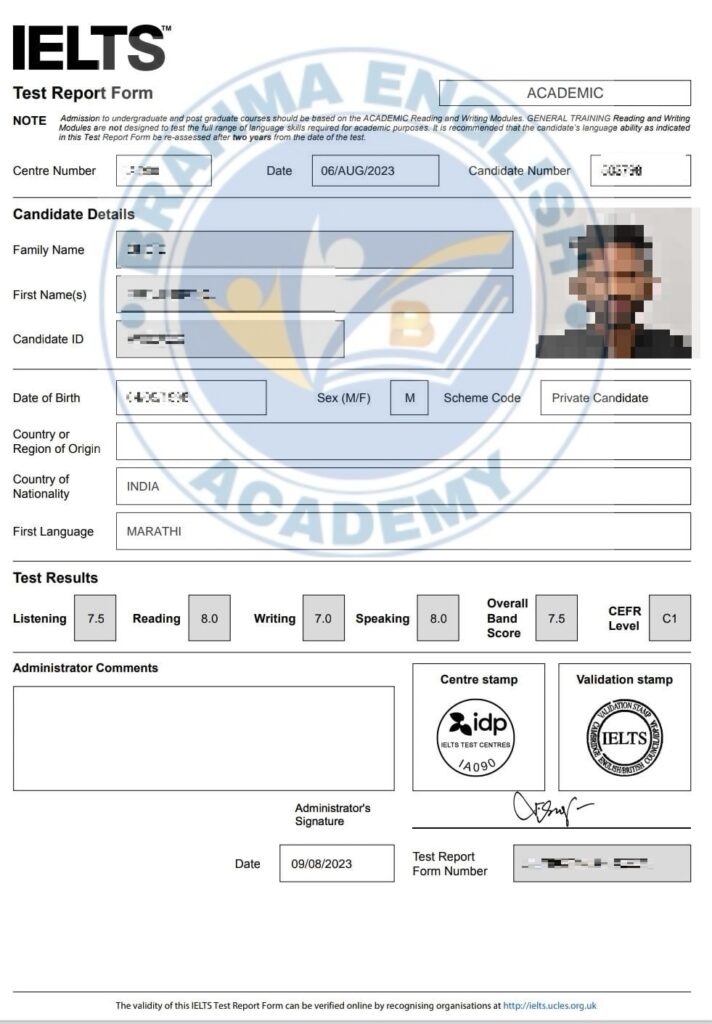
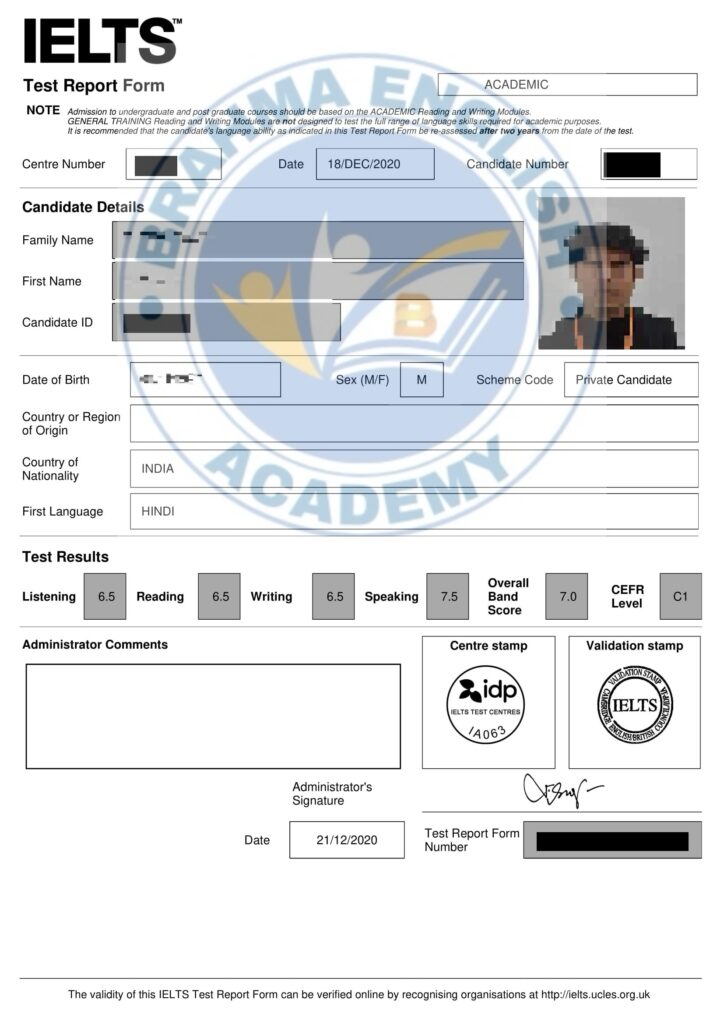

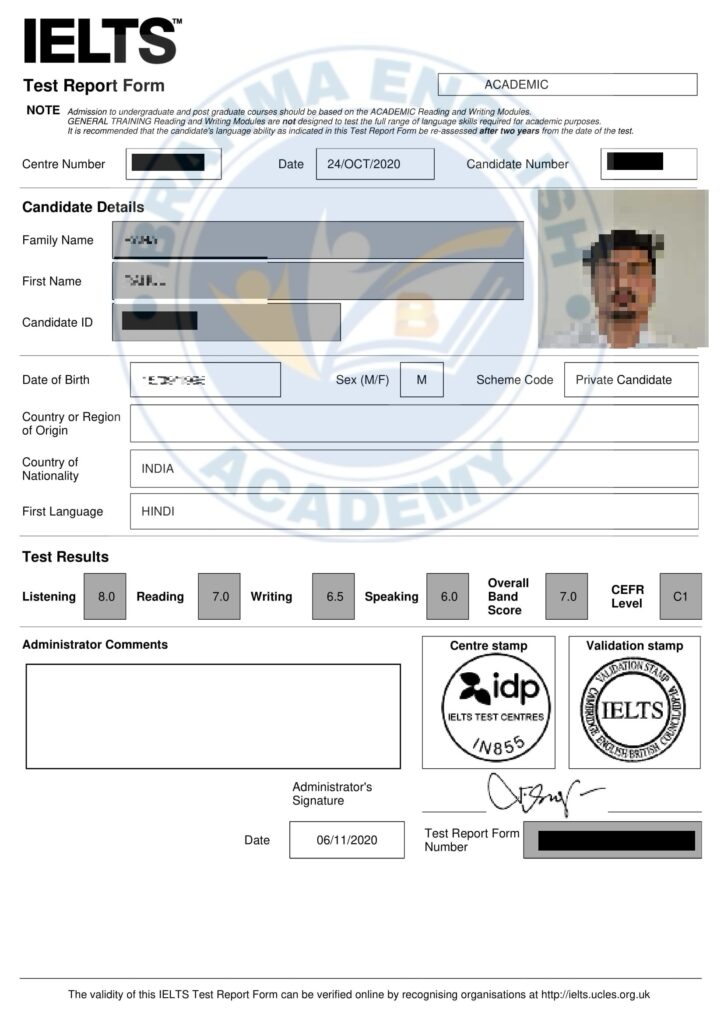



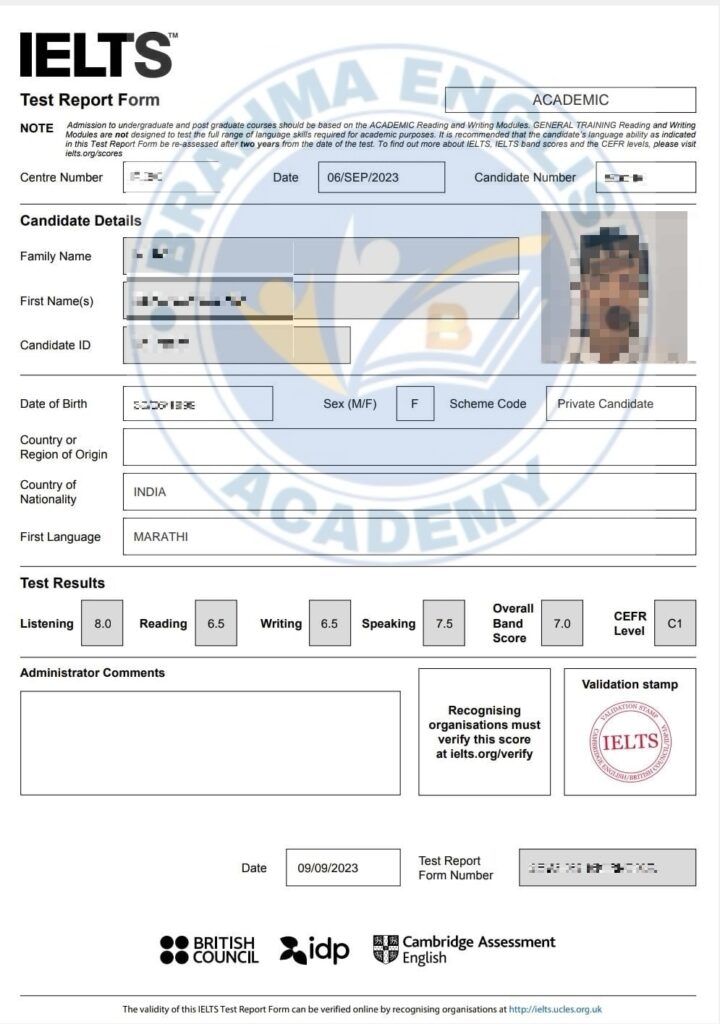


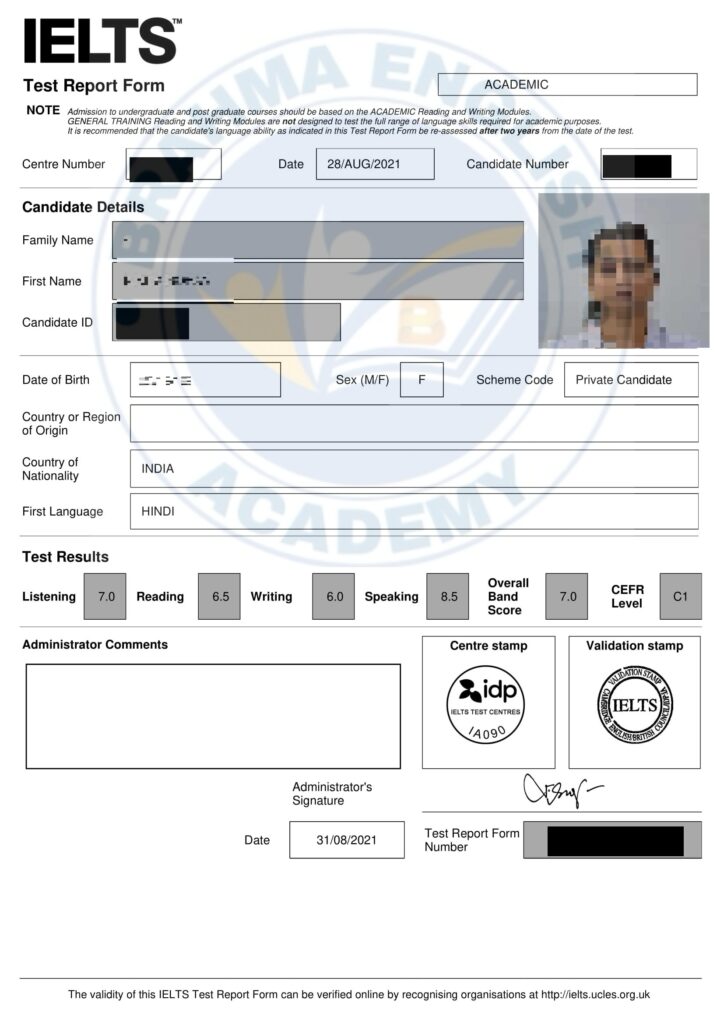
Achieve Your Dreams with the Best IELTS Classes in Pune at Brahma English Academy!
Brahma English Academy is the Best IELTS Training Institute in Pune, offering expert coaching to help you achieve top band scores. Join the Best IELTS Classes in Pune and take the first step toward your dreams of studying or working abroad!
At Brahma English Academy, we specialize in providing comprehensive IELTS coaching to help you excel in all four modules: Listening, Reading, Writing, and Speaking. Whether you’re aiming to study, work, or settle abroad, our expert trainers are here to guide you every step of the way.
- Personalized Training: We assess your strengths and weaknesses to design customized learning plans.
- Experienced Trainers: Learn from certified professionals with years of experience in IELTS preparation.
- Mock Tests & Feedback: Regular mock tests with detailed feedback to improve your performance and build confidence.
- Flexible Batches: Choose from convenient timings that fit your schedule.
- Proven Results: Join our list of successful candidates who have achieved high IELTS band scores.
- Study Material: Access exclusive resources and strategies to tackle the exam effectively.
Located in the heart of Pune, Brahma English Academy is committed to helping you achieve your goals. Enroll now and start your journey toward success with the Top IELTS Classes in Pune!
📞 Contact us today to book a free consultation or learn more about our programs.
IELTS Exam Pattern
(International English Language Testing System)
The IELTS (International English Language Testing System) is a widely recognized test for assessing English language proficiency. It evaluates the language skills of candidates in Listening, Reading, Writing, and Speaking. The test is available in two formats: IELTS Academic and IELTS General Training, each with specific purposes and audiences.
Here is the detailed syllabus:
1. IELTS Test Format
- Total Duration: Approximately 2 hours and 45 minutes
- Modules:
- Listening (30 minutes)
- Reading (60 minutes)
- Writing (60 minutes)
- Speaking (11–14 minutes)
2. Listening Module
Duration: 30 minutes (plus 10 minutes to transfer answers to the answer sheet)
Number of Questions: 40
Structure: Divided into 4 sections, with increasing difficulty.
Sections:
1. Section 1:
o A conversation between two people in a social context (e.g., booking a hotel).
o Focus: Understanding specific factual information.
2. Section 2:
o A monologue in a social setting (e.g., a speech about local facilities).
o Focus: Identifying key details and main points.
3. Section 3:
o A conversation among multiple people in an academic or training context (e.g., discussing a
project).
o Focus: Understanding complex ideas and opinions.
4. Section 4:
o A monologue on an academic subject (e.g., a lecture).
o Focus: Comprehending detailed and structured information.
3. Reading Module
Duration: 60 minutes
Number of Questions: 40
The reading syllabus differs for Academic and General Training versions:
Academic Reading:
- Passages: 3 long texts (e.g., journal articles, reports, academic papers).
- Content: Factual, descriptive, analytical, or argumentative.
- Skills Assessed:
- Skimming for main ideas
- Scanning for specific details
- Understanding the writer’s tone, purpose, and arguments
General Training Reading:
- Passages:
- Section 1: 2–3 short factual texts (e.g., advertisements, notices).
- Section 2: 2 texts on work-related issues (e.g., training materials).
- Section 3: 1 longer, general-interest text (e.g., magazine article).
- Focus: Practical, everyday reading skills.
4. Writing Module
Duration: 60 minutes
Number of Tasks: 2 tasks (Task 1 and Task 2)
The tasks differ for Academic and General Training versions:
Academic Writing:
1. Task 1 (20 minutes):
o Write a report summarizing and comparing data from a chart, graph, table, or diagram.
o Word Count: At least 150 words.
2. Task 2 (40 minutes):
o Write an essay responding to an argument, problem, or opinion.
o Word Count: At least 250 words.
o Focus: Academic tone, clear structure, and logical arguments.
General Training Writing:
1. Task 1 (20 minutes):
o Write a letter (formal, semi-formal, or informal) based on a given situation (e.g., requesting information, making a complaint).
o Word Count: At least 150 words.
2. Task 2 (40 minutes):
o Write an essay responding to a point of view, problem, or argument.
o Word Count: At least 250 words.
o Focus: Everyday language and reasoning.
5. Speaking Module
Duration: 11–14 minutes
Structure: Divided into 3 parts.
Part 1: Introduction and Interview (4–5 minutes):
- General questions about the candidate’s background, interests, or daily life.
- Focus: Fluency in discussing familiar topics.
Part 2: Long Turn (3–4 minutes):
- Task: Candidate speaks for 1–2 minutes on a given topic (e.g., “Describe a place you enjoy
visiting”). - 1 minute is given to prepare notes.
- Focus: Ability to structure a response and elaborate on ideas.
Part 3: Discussion (4–5 minutes):
- Task: A two-way discussion on abstract or complex topics related to Part 2 (e.g., “What are the
advantages of tourism?”). - Focus: Analytical skills and ability to express and justify opinions.
Scoring
- Each module is scored on a band scale of 0–9, with whole and half-band scores.
- An Overall Band Score is calculated as the average of the four module scores.
- Band descriptors assess performance in fluency, coherence, grammar, vocabulary, and
pronunciation.
IELTS Band Score Descriptors
- Band 9: Expert user
- Band 8: Very good user
- Band 7: Good user (required for many immigration and academic purposes)
- Band 6: Competent user